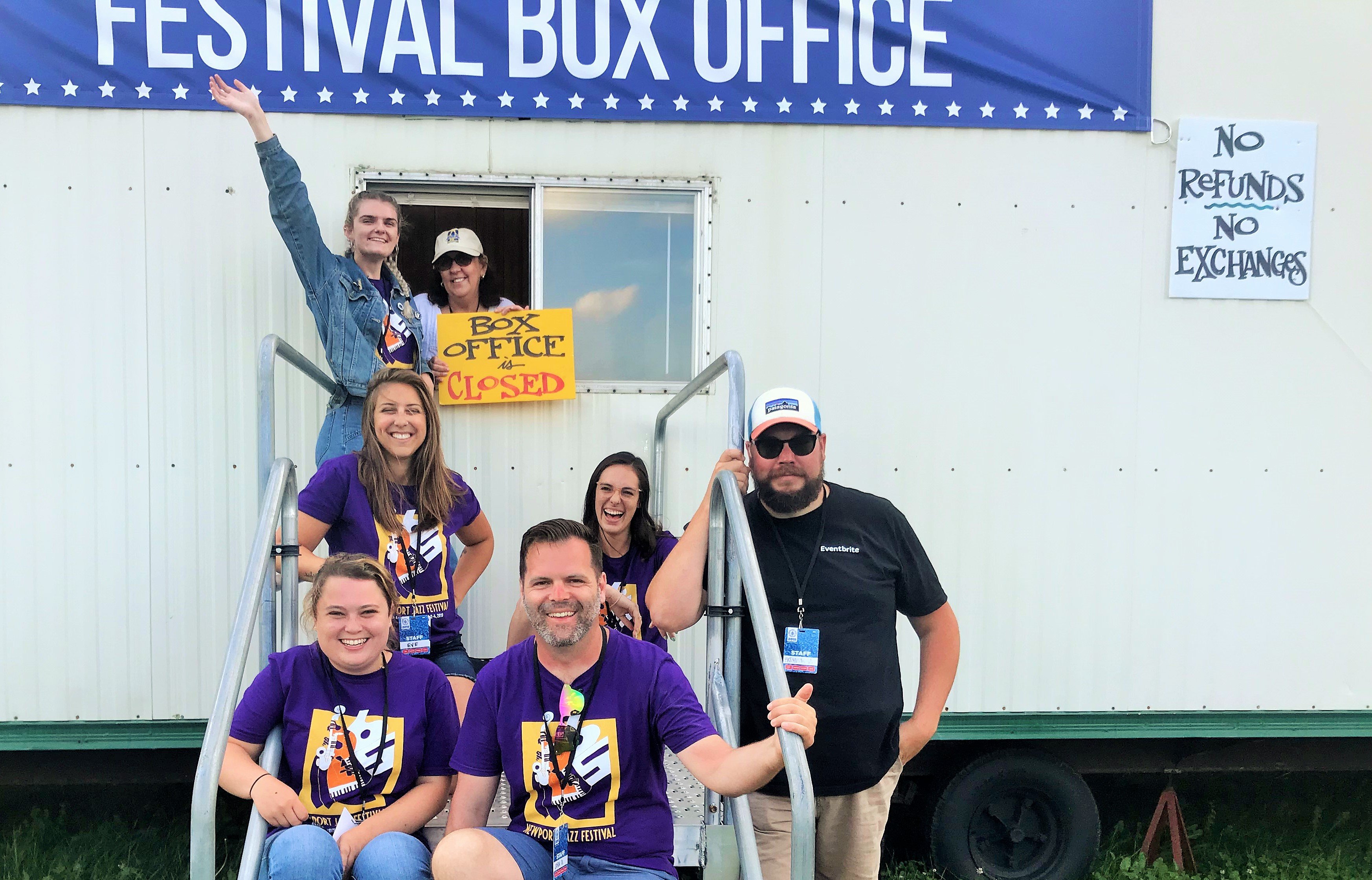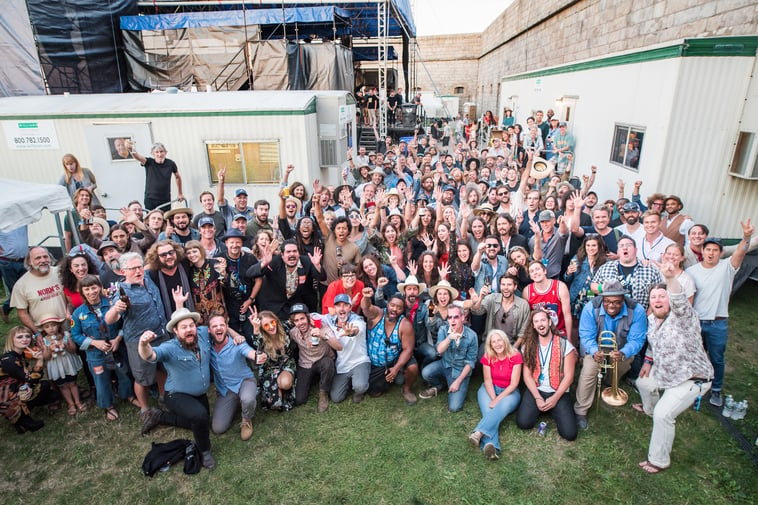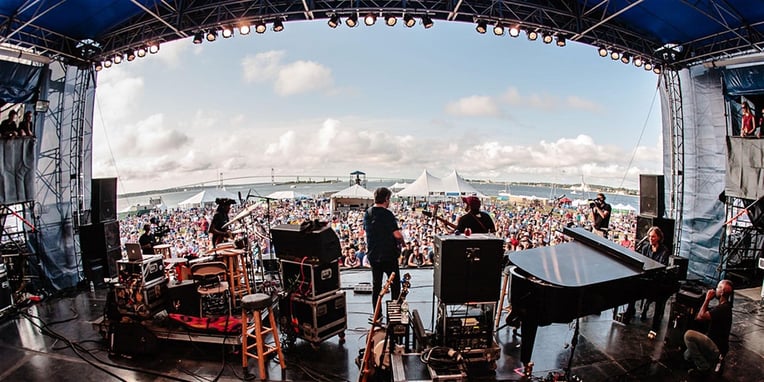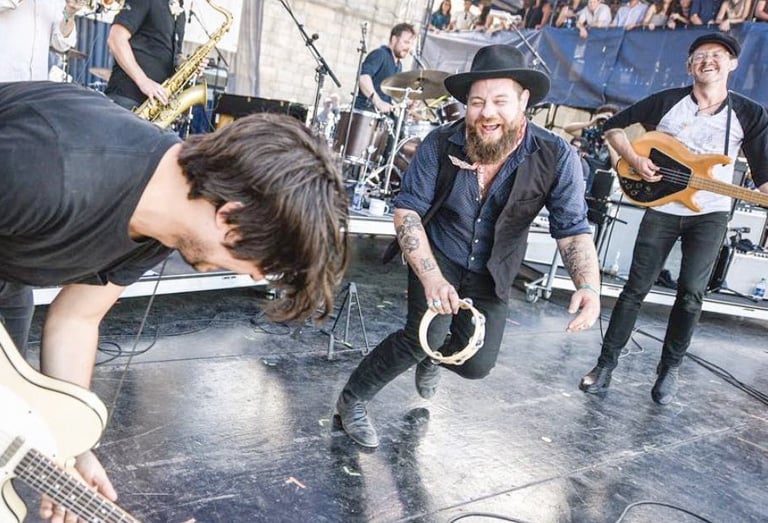INTRODUCTION
For our latest interview we sat down (virtually of course) with Deb Girard, the Director of Ticketing Operations and Administrations at two of the most iconic festivals in the country: the Newport Folk and Jazz Festivals in Newport, RI.
With my background in ticketing, I was excited to talk with Deb about all things box office and ticketing operations. And she didn’t disappoint. This interview is definitely for you die hard ticketing pros. Deb has been with the Newport Festivals Foundation for 20 years, so she is a fountain of wisdom and knowledge. Enjoy.
Deb (white hat) and her crew.
Here are some of my favorite takeaways from our conversation:
- Unhappy fans just want to be heard.
- Listen to everyone’s input.
- Your client rep is your friend.
- Tickets are more than just a piece of paper, a wristband, or a mobile scan that grants entry.
- Ticketing touches every department.
- Empower your team.
- Start backwards and go forward.
- And just wait till you read her story about why a patron was in tears when they couldn’t get tickets.
-------
Before we get started, we wanted to call out the Newport Festivals Musician Relief Fund
This fund will provide financial relief to musicians experiencing lost income as a result of COVID-19 through rapid micro and full grants. To support their efforts you can Donate Here
-------
I really appreciate you doing this Deb.
Of course. I’m happy to help.
How did you get started working in events and ticketing?
I was working as a location manager in the film industry on the west coast and decided it was time for me to leave and make a career change. I picked Newport, Rhode Island off of a map, because I thought it was a beautiful place to live. I sold everything and drove across the country. I remembered hearing about the famous Newport Folk Festival and Newport Jazz Festival. I met with the festival director at the time and she said, "We have a lot of seasonal people. They come back year to year, but our box office manager isn’t returning, and I'm going to guess you're probably qualified to do that." I said, "Okay, sure." There is no ticketing school so I just just had to dive in head first and go for it! 20 years later, I'm still doing it.
Over the years my title has evolved from Box Office Manager to Director of Ticketing Operations and Administration.
I heard that you used to work on Robin Williams films. Is that correct?
Yes, I did. Mrs. Doubtfire and Nine Months.
Are there any skills that you gained as a film location manager that you have applied to ticketing and festivals?
The location manager position was probably the hardest job I ever did. You are forced into situations that require you to think fast on your feet. If there's a problem that needs to be solved, you never say no first. I learned to say, "I'll get back to you." We had a lot of unhappy people when we were filming on the street, because they couldn't walk by and get to their houses. I had a lot of screaming neighbors in my face. That was probably a flash forward to the future of having unhappy fans at the window. I realized that they just want to be heard. I tell everybody that works at my window "They just want to vent."
When you're leading up to an event, what are your top priorities?
Nine months out:
I'm building all the events for the onsales. That includes creating the ticket types, working with our creative director on updating the website, and setting up the ticket exchange with Lyte. It may only be three things, but they are three big things.
Six months out: is where Lennd comes in. I am setting up my forms and passes in Lennd for credentialing. Three months out is when I start to pull the credentialing needs for the staff, artists, vendors, and sponsors from Lennd.
A month out: is when we hit the ground running. The site is getting built and my focus is on fulfilling internal ticket requests. I am also responsible for the on-site internet. I work with the on-site techs to get the whole site wired up. Our venue is a state park on the tip of the ocean. The internet can be a little sketchy.
Given your location, do you have a plan B, or a plan C if your internet goes out?
The good thing for the folk festival is that we're sold out every year. I don’t have to worry about scanning tickets that were just purchased because all the barcodes have been downloaded. Obviously, it's not great for everything else on the site. I love technology, and everybody knows that, but I'm also very aware of the cutting edge versus the bleeding edge, and I think you really have to curate your technology for your particular event, and exactly where the space is, and not overwhelm it with things.

The crew - Photo Cred: Brian Lima
For the ticketing and credential ops geeks out there, I thought I'd dive into some specifics:
Sounds good to me.
How many ticket and pass types do you have for the festivals?
The folk festival has about 10-12 pass types and that’s because we have multi-day passes. The jazz festival is a little different because it has a reserved section and student tickets. Credentialing has about 30 different types. There was a point where we had so many types and we were able to consolidate them down.
How did you consolidate your types?
It's a yearly conversation and it seems to get more difficult each year. We're all on the same page that we need variable access control. A universal problem is what to name your pass and credential types. It’s something we’re very sensitive to. We don’t like to use the word “VIP” because we feel that everyone is important. For the staff, we break out and identify types of vendors and departments. It could be an electric vendor as opposed to production. It also helps people solve problems because it’s easy to see who does what. You wouldn’t ask the stage crew to bring you a table and chair.
Photo Cred Brian Lima
Do you have any other tips or suggestions on how to navigate tough conversations and competing ideas?
Everybody's coming from a different place, it’s important to look at the big picture and listen to everyone’s input. I like to have people define the different positions and cite examples. I also try to get the team to look at things from the point of view of those that are new to working on site. We have 300 people that come in for the event weekends. They don’t all know each other and it can be frustrating to not know what other people do.
What is your favorite part of the process, and your least favorite part of the process?
My favorite part is also my least favorite part. When I'm challenged with an issue that seems impossible to solve, that's my least favorite part. But then, my favorite part is breaking the system to find a way to solve it. I love thinking of new workarounds.
When you think of workarounds, whether it be with your ticketing system, or parking, are you trying to figure those out by yourself, or are you speaking with anybody else to try and get ideas and suggestions, and if you are, who?
I am a one-person ticketing department. We use Eventbrite and I have a wonderful client rep that I work with. I have a standing call with him for an hour a week. I think more people should do this. Even if there's nothing happening immediately, it gives us an hour a week to catch up. These are the times that I bounce ideas off the wall with him. He’ll talk to me for an hour straight about how to solve parking.
As a Customer Success Manager at Lennd with a ticketing software background, I can appreciate that answer.
Great. It's true. Your client rep is definitely your friend. I've been very fortunate that I've had really good ones over the years.
Do you have any other technology that you rely on that makes your job easier?
One of the nice things about Eventbrite is that they have an open API, which is great. The API allows me to use the integrations with Lyte and with Lennd. Previously, I always had to hand process every internal ticket request that came in. The big strength that I have with Lennd is now I can just send a link out and they can pay for the tickets themselves. We also use Eventbrite’s integration with MailChimp.
Are there any metrics or reports that you rely on to do your job?
When you have a sold out festival or an event, people will ask me "What do you do? You must be sitting with your feet up?” It's actually more work when you have a sold out show because there's such low inventory that is allocated for trade, sponsor agreements and guest tickets. It's really important for me to precisely track every single thing to make sure that we don't run out. There's no perfect report that could ever pull the kind of sales summary and inventory tracking that I need. I run five reports and put all that information into an Excel spreadsheet. I wish I could pull a report that says “This is exactly how many tickets I sold on this date last year.”
How do you manage competing requests and the limited inventory across so many groups?
It's statistics and data. I cap them. If you are a sponsor or a department, you get X amount of tickets to use based on your agreements. It’s all about setting expectations because there is a limited amount of tickets. We’re a small venue by festival standards at a state park with a strict capacity.

Now I want to talk about team dynamics. I know you guys are a small team, so what departments and people do you collaborate to do with your job? You mentioned your ticket software sales rep. Are there any other internal or outside teams you work with that are critical to do your job?
Tickets are more than just a piece of paper, a wristband, or a mobile scan that grants entry. We have a responsibility to provide each of the ticket holders a great experience. To accomplish that, I have to collaborate with the creative team, the marketing team, artist relations, vendors, accounting, and security. Ticketing touches every department like a Venn diagram. Everybody has an input because it's an experience. We sell out the folk festival without announcing a single artist and that's because we don't want to put it all on one artist's back. Our folk festival is a total experience.
What makes your festival so great that people come back year after year without even knowing who the lineup is?
I think it’s because we're fan oriented, and that's the perspective that we take all the time. It's not necessarily about making the most money, or having the most popular artists. I've heard so many people say, "I can bring my family to this event." We are a nonprofit, our focus is on music education. We also care a great deal. I receive all ticket info@ emails, and take pride that nobody usually has to wait more than an hour for an email response.
What are you looking for when you hire your Box Office and Credential Staff?
I am looking for somebody who is hungry, passionate, and ready to learn the industry. For me, they need to understand and accept that the box office isn't as sexy as working backstage, and that they may never hear a note of music.
Do you have any tips for keeping your team happy and productive at the event?
They have to feel invested. I generally empower them with information, because ultimately it allows them to problem solve on the spot. They're not robots. I like to keep them involved in the process, so it gives them some skin in the game and helps them understand the big picture. Their customer service and troubleshoot output comes back to me tenfold.
We're also trapped in a box office trailer all day. It's important to me that they walk around on the site and actually see what the result is of what they're all working towards. I have to do that for myself as well. I'm not going to lie, supplying them with food and drink all day also goes a long way. 
Photo Cred: Adam Kissick
I have a couple other final questions. This one's a little bit more fun. What is your craziest event experience?
There's been so many crazy things, but I always come back to this encounter that I had with a fan that I never forgot about. This guy wanted tickets to the folk festival desperately, and of course we were completely sold out. He was pleading, and in tears. I started to feel badly for him. Then he told me that he just started dating a girl, and that if there was a way I could hook him up with the tickets, it would certainly guarantee that he'd get laid. I was like, "Yeah, no. That's a hard no." It may not seem the craziest to you, but I was just floored. I was waiting for this big heart wrenching story and it was just, "Well, I want to get laid." At least he was honest about it.
If you could interview anybody in the industry, who would you interview?
I’m fortunate because George Wein who is the founder of both of our festivals is still involved at age 94. He started producing festivals in 1954. The Newport Jazz Festival is considered the first outdoor festival in the United States. He’s still a great resource because he has seen it all and has great ideas. Even to this day, he always says to me “What are the ticket counts?”
Last question, how do you see your role or events in general changing or evolving over the next 10 years?
Honestly, if I was answering this question about a month ago, I might have some pretty solid ideas but in the time of the pandemic, I really think the event landscape is going to look a lot different, and there is going to be a whole new set of best practices that aren't even imagined yet. I belong to INTIX which is a national ticketing association, and they've been a really good resource on how to navigate this. We spend a lot of time looking at reverse logistics. At the end of the day, that's really what we should be doing. That is the best, best practice. If you can start backwards and go forward, that's going to be your success.
LENND, INC
Lennd is a next generation event management platform that simplifies operations and logistics so event teams can work smarter, move faster, and improve their ROI.
To learn why some of the most respected event teams trust Lennd to power their operations or sign up for a demo: www.lennd.com
NEWPORT FESTIVALS FOUNDATION
The Newport Festivals Foundation fosters the legacy and expands the impact of its Festivals through educational initiatives that celebrate innovation while preserving the deep traditions inherent in Jazz and Folk music. www.newportfestivals.org



